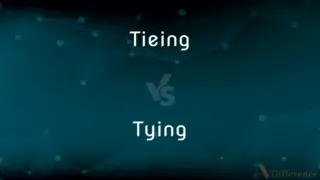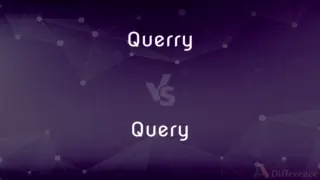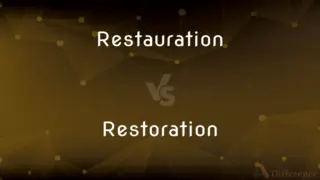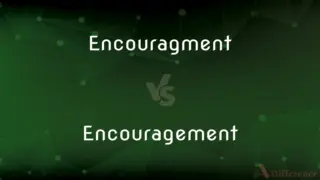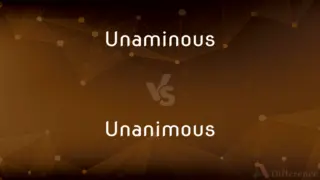Dissappoint vs. Disappoint — Which is Correct Spelling?
By Tayyaba Rehman — Updated on March 27, 2024
"Dissappoint" is incorrect. The right spelling is "Disappoint," which means to fail to meet the expectations or hopes of someone.
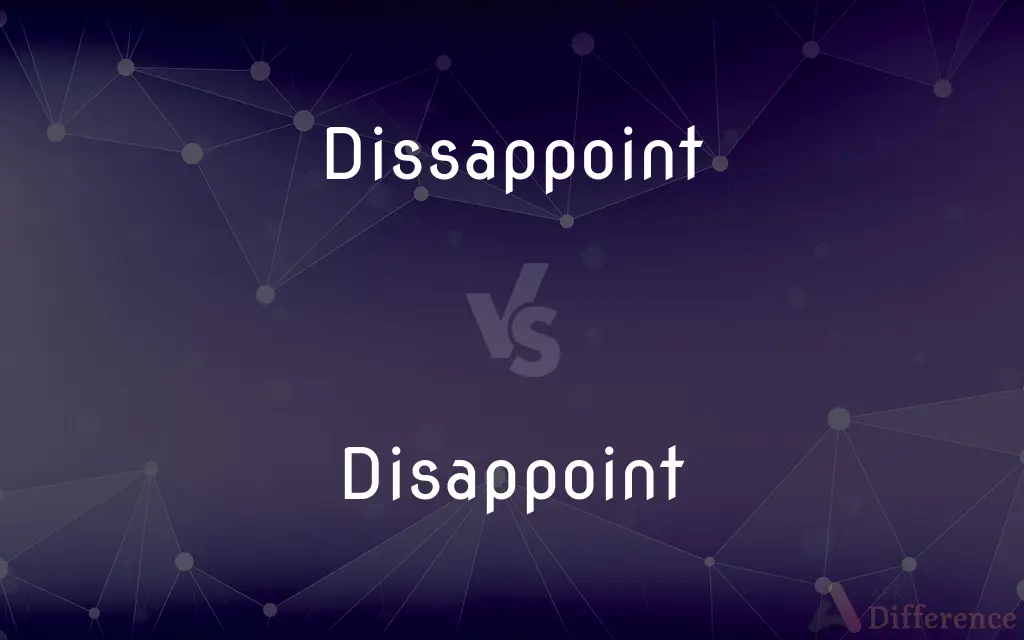
Table of Contents
Which is correct: Dissappoint or Disappoint
How to spell Disappoint?

Dissappoint
Incorrect Spelling

Disappoint
Correct Spelling
ADVERTISEMENT
Key Differences
"Point" has one "s," so does "disappoint."
Remember there's only one "s" in "disaster," and similarly in "disappoint."
Recollect the phrase: "It's a disappointment when there's an extra 's'."
Think of the prefix "dis-" which means "apart" or "away."
Visualize the word as "dis" + "appoint."
ADVERTISEMENT
How Do You Spell Disappoint Correctly?
Incorrect: He didn't want to dissappoint his coach by missing practice.
Correct: He didn't want to disappoint his coach by missing practice.
Incorrect: I hope I don't dissappoint my parents with my grades.
Correct: I hope I don't disappoint my parents with my grades.
Disappoint Definitions
To let someone down by not meeting their expectations.
The movie disappoints with its predictable plot.
To cause a feeling of sadness or displeasure.
It disappoints me to see you this way.
To fail to fulfill a hope or expectation.
The outcome disappointed many.
To leave unsatisfied.
The product disappoints in quality.
To hinder from attainment of expectation.
Bad weather can disappoint our plans.
To fail to satisfy the hope, desire, or expectation of.
To frustrate or thwart
"I will not disappoint the confidence you have put in me" (Wayne A. Budd).
To cause disappointment.
(transitive) To sadden or displease (someone) by underperforming, or by not delivering something promised or hoped for.
His lack of respect disappointed her.
I was disappointed by last year’s revenue.
(transitive) To deprive (someone of something expected or hoped for).
To fail to meet (an expectation); to fail to fulfil (a hope).
To show (an opinion, belief, etc.) to be mistaken.
To prevent (something planned or attempted).
(Internet slang) disappointed
To defeat of expectation or hope; to hinder from the attainment of that which was expected, hoped, or desired; to balk; as, a man is disappointed of his hopes or expectations, or his hopes, desires, intentions, expectations, or plans are disappointed; a bad season disappoints the farmer of his crops; a defeat disappoints an enemy of his spoil.
I was disappointed, but very agreeably.
To frustrate; to fail; to hinder of result.
His retiring foeShrinks from the wound, and disappoints the blow.
Fail to meet the hopes or expectations of;
Her boyfriend let her down when he did not propose marriage
Disappoint Meaning in a Sentence
She didn't want to disappoint her friends, so she went to the party despite feeling tired.
Common Curiosities
What is the verb form of Disappoint?
The verb form is "disappoint."
Why is it called Disappoint?
It's called "disappoint" because it denotes a failure to meet expectations, originating from the prefix "dis-" (meaning apart) and "appoint" (meaning to decide).
What is the root word of Disappoint?
The root word is "appoint."
What is the pronunciation of Disappoint?
It is pronounced as /ˌdɪsəˈpɔɪnt/.
Which conjunction is used with Disappoint?
Conjunctions such as "and" or "or" can be used, depending on the sentence.
Is Disappoint a negative or positive word?
"Disappoint" is generally considered a negative word.
Which vowel is used before Disappoint?
The vowel "a" is used before disappoint, as in "a disappointment."
What is the singular form of Disappoint?
"Disappoint" is already in the singular form.
What is the plural form of Disappoint?
"Disappoint" as a verb does not have a plural form. The noun "disappointments" is the plural of "disappointment."
Is Disappoint a countable noun?
"Disappointment" is countable. For example, "There were many disappointments."
Which article is used with Disappoint?
The articles "a" and "the" can be used, as in "a disappointment" or "the disappointment."
Is Disappoint a noun or adjective?
"Disappoint" is primarily a verb.
Is Disappoint a vowel or consonant?
"Disappoint" is a word, consisting of both vowels and consonants.
Is Disappoint a collective noun?
No, "disappoint" is not a collective noun.
Which determiner is used with Disappoint?
Determiners like "this" or "that" can be used, e.g., "this disappointment" or "that disappointment."
What is the first form of Disappoint?
The first form is "disappoint."
Which preposition is used with Disappoint?
"In" can be used, as in "disappointed in someone."
Is Disappoint an adverb?
No, "disappoint" is not an adverb.
What is the second form of Disappoint?
The second form is "disappointed."
What is the third form of Disappoint?
The third form is "disappointed."
Is the word Disappoint imperative?
It can be used in the imperative mood, e.g., "Don't disappoint me."
How do we divide Disappoint into syllables?
It can be divided as dis-ap-point.
What is a stressed syllable in Disappoint?
The stressed syllable is "point" in "disappoint."
Is Disappoint an abstract noun?
"Disappointment" (derived from disappoint) is an abstract noun.
How is Disappoint used in a sentence?
"He didn't want to disappoint his parents, so he studied hard for his exams."
Is the Disappoint term a metaphor?
No, "disappoint" is not typically used as a metaphor, though context could allow for metaphorical use.
How many syllables are in Disappoint?
There are three syllables in "disappoint."
What part of speech is Disappoint?
"Disappoint" is a verb.
What is another term for Disappoint?
Another term could be "let down."
What is the opposite of Disappoint?
The opposite could be "satisfy" or "elate."
Share Your Discovery

Previous Comparison
Normaly vs. Normally
Next Comparison
Mispelled vs. MisspelledAuthor Spotlight
Written by
Tayyaba RehmanTayyaba Rehman is a distinguished writer, currently serving as a primary contributor to askdifference.com. As a researcher in semantics and etymology, Tayyaba's passion for the complexity of languages and their distinctions has found a perfect home on the platform. Tayyaba delves into the intricacies of language, distinguishing between commonly confused words and phrases, thereby providing clarity for readers worldwide.

